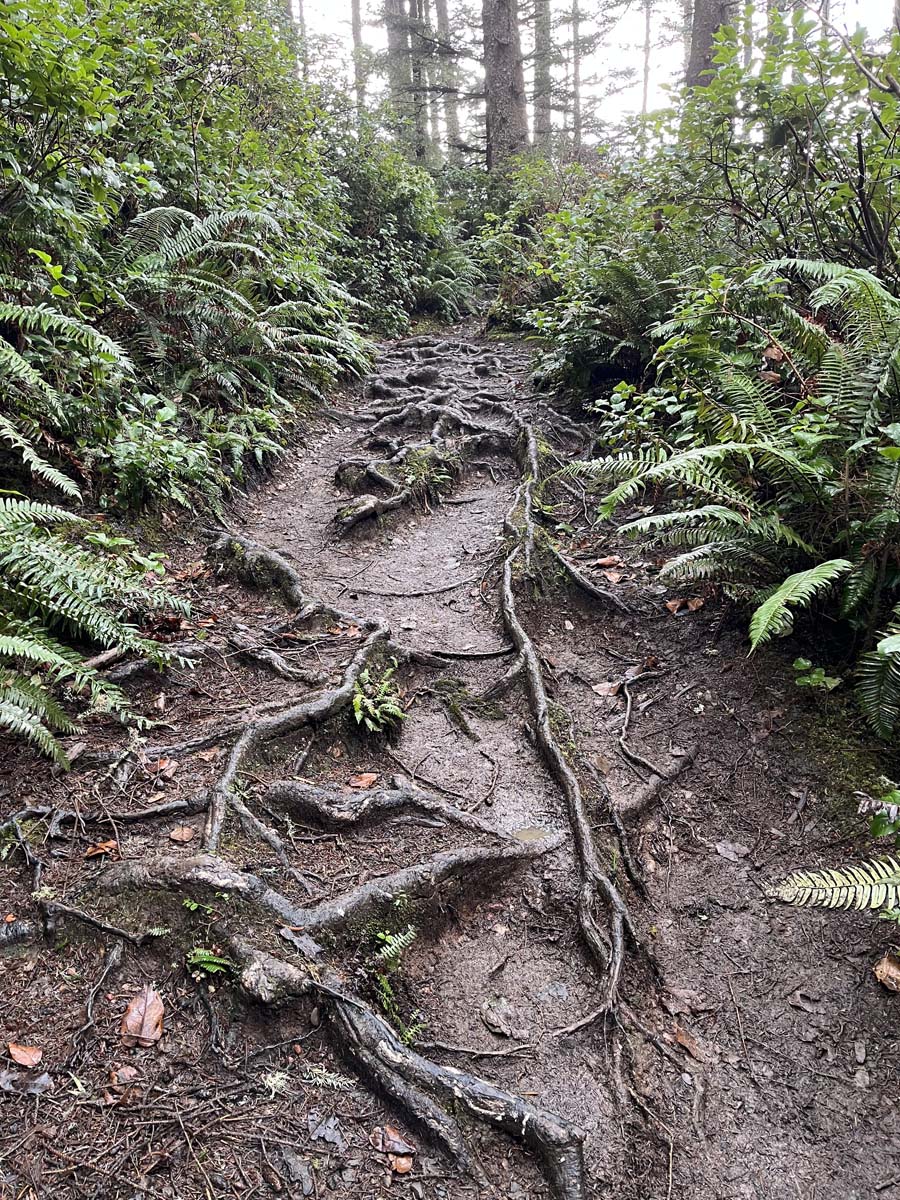I’m not asking you to walk with me today. Rather, sit back and let me regale you with a tale of failure: the failure to hike to a seemingly easy destination, Cape Falcon at the Pacific coast.



The sign should have been a warning, the generously left behind walking sticks not been ignored. The path seemed perfectly fine, until it wasn’t. Landslides that had felled trees could be ignored, climbing over the trunks was not a major effort.


But then the mud set in, in depth and fluidity that you really could not walk on it without sinking in to the ankles. So you had to find stepping stones, utilize the root systems of the old growth trees or make side detours, only to find your way back to a path that was now covered with mall rivulets of running water.




Jumping puddles….
I gave up halfway in, saying good bye to the dream of seeing the Pacific ocean from high up, off cliffs that I had never visited before.


Let me hasten to add that of course it was not a failure. It was an adventure in a damp, dripping, moist, muddy universe that provide innumerable shades of intensely saturated greens, gentle rain that was barely felt, squishy noises that echoed delightful childhood memories of stomping around in your ladybug rubber boots.


The forest verdant. Wet. Full of new growth, pretending spring was already here.






It was also a reminder of how privileged we are to live at the threshold of so many different micro climates, the dry, steep cliffs of the Gorge on Wednesday, the temperate rainforest at the coast on Friday, all easily reached with a short drive.

Failure, as a concept, was on my mind because of two things I read recently. Both told stories about the consequences of failure, with both acknowledging that our society is particularly, grossly even, success oriented, with success structurally reserved for a few. Failure, then, can lead to compensating mechanisms that prove to be intensely destructive. At least that was the upshot of a thoughtful, well argued article by Tom Nichols in the Atlantic, The Narcissism of the Angry Young Men. The essay discusses the misfits who become killers, sometimes mass murderers,
“show(ing) them, in general, to be young losers who failed to mature, and whose lives revolved around various grievances, insecurities, and heroic fantasies…. But these young males, no matter how “quiet,” are filled with an astonishing level of enraged resentment and entitlement about their roles as men, and they seek rationalizations for inflicting violence on a society they think has both ignored and injured them. They become what the German writer Hans Magnus Enzensberger called “radical losers,” unsuccessful men who feel that they have been denied their dominant role in society and who then channel their blunted male social impulses toward destruction.”

Highly recommended reading, which, in my case, was paired with an essay by Costica Bradatan, a Romanian immigrant and Professor of Humanities at Texas Tech University discussing his new book, “In Praise of Failure: Four Lessons in Humility.”
In a tongue in cheek assessment of his own predilections he writes:
“America’s noisy worshiping of success, its mania for ratings and rankings, the compulsive celebration of perfection in everything served only as a facade. Behind the optimistic veneer there lies an extraordinary fear of failure: the horror of going down and going under, of losing face and respectability, of exclusion and marginalization. It’s not success but failure — the savage fear of it — that lies at the heart of the American dream. The country is custom made for an aficionado of failure like me.”
The book is devoted to four major historical figures actively courting failure in their pursuit of meaning and transformation (or religious transcendence.) I have only read the chapter on Simone Weil which is available here, and was much taken by Bradatan’s narrative approach (and skill) and not at all by his conclusions. There is something about the proscription to be humble, to let failure lead you inwards on some self discovery journey that rubs me as too convenient in a society that is set to clamp down on anger and resistance provoked by injustice. (I must also admit that I will never be able to be a neutral reader on the saintliness of Ghandi, one of the four figures discussed in this book. Remember, Gandhi advised the Jews in Germany to offer passive resistance to the Nazi regime—and to give up their own lives as sacrifices. He told the Jews to pray for Adolf Hitler. “If even one Jew acted thus,’ he wrote, ‘he would salve his self respect and leave an example which, if it became infectious, would save the whole of Jewry and leave a rich heritage to mankind besides.”(Ref.)

Yes, excessive anger leading to mass shootings is catastrophic. But humble cowing in front of oppressive forces that promise enlightenment and salvation if you keep your voice down and obey, is not desirable either. There are too many requests for being humble in the air right now and I always wonder about the underlying societal frictions. I do believe it is important to experience failure (and not shelter kids from that experience, in particular) and learn from it, perhaps grow through it, but let’s not tie it to humility beyond curbing our narcissistic streaks. There’s a slippery slope from humility to servility to conformity and consent, in my not so humble opinion.


One last glimpse of Friday’s wondrous views: neither humble nor proud, the elks were taking it easy, some as mud-caked as their photographer by the end of the day. Pretty amazing.




Music today is America by Jewish (immigrant) composer Ernest Bloch who lived at the Oregon Coast.

PS: This WOULD have been the view, photograph from internet:

